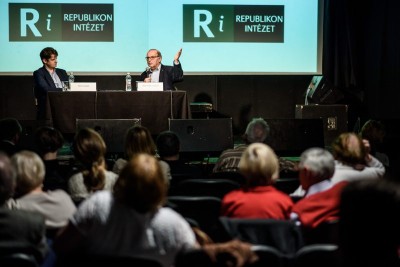The 2017 Hungarian presidential elections were held on March 13, as the first term of President János Áder came to an end. The governing party, Fidesz, has a clear majority in the National Assembly and is facing a weak, segregated opposition. Since according to the constitution, the Hungarian president can be elected by a simple majority, it was clear that János Áder would triumph once more. The less predictable outcome was that the small, often disputing with one another parties of the left-wing liberal opposition lined up behind a credible, well-respected candidate: László Majtényi. This nomination required 40 supporters within Parliament and could only succeed with the cooperation of the opposition (apart from far-right Jobbik). Although János Áder has, indeed, been re-elected for next 5 years, Majtényi’s nomination alone could mean a renewed beginning for Hungarian liberal democracy and constitutionalism.
The president of Hungary fulfils a symbolic role. The main objective of the position is to represent the Hungarian nation and to promote and defend constitutionalism, thus the president lacks daily political power. András Bragyova (a jurist, a university teacher and a member of the Hungarian Academy of Science) emphasised that despite appearances the position is still relevant today. Although it is a manifestation of “historical memory”, it is also an influence that “every country needs”, said Bragyova at Republikon Institute’s conference, held just a few days before the election.
The Hungarian National Assembly elects a new president every 5 years. The first round of the secret ballot is successful if two-thirds of the members support one of the candidates. If the first round proves unsuccessful, whoever gets more votes in the second round is immediately elected president.
Views on the current president amongst the Hungarian public are divided. Some claim that János Áder is a successful president, as he exercised his constitutional veto more than his predecessors had done. On the other hand, some believe that he should have made more effort to protect the constitutionalism of the country. His opponent, László Majtényi, for example, would expect the president of Hungary to initiate more laws in the name of constitutional protection and make more speeches in Parliament about the important issues of the country.
Of course, Majtényi is no stranger to political life. He is a constitutional expert and a member of the Hungarian Academy of Science. He was also the Hungarian privacy commissioner for 6 years and has been asked to fill political positions many times. He also takes a liberal stand internationally by, for example, attending the events of the European Liberal Forum.
This time, Majtényi’s nomination came from a group of civilians, famous Hungarian poets, philosophers and musicians. The extra-parliamentary initiative was an important persuasive factor for Majtényi in accepting the nomination. The movement then escalated to a Parliamentary nomination, requiring 40 signatures from MPs. Majtényi set his views forward and asked for the support of those parties that could agree with his objectives, which included: re-establishing constitutionalism, eliminating corruption and poverty, and a focus on the future generations. These points proved to be the grounds on which the fragmented left-wing and liberal parties in the Hungarian Assembly could agree.
László Majtényi took the opportunity of being nominated to express his criticism against Viktor Orbán’s political system. He toured the country for months and, as usual in the case of presidential nominees, made a speech in front of the Members of Parliament on March 13, the day of the election. In this speech, he criticised Orbán’s abuse of power in a bespoke, technical way. He emphasised the importance of constitutionalism and its harmful demise in Hungary’s present system, and started a dialogue about forms of political control. He urged the Hungarian people to see that they could “trust the defence of independent institutions against the selfishness of the powerful”. He finished his speech by stating that a republic with independent institutions needs to be restored.
“I think my nomination is a success story in itself, since becoming president was not our main goal”, said Majtényi at Republikon Institute’s conference. All opposition parties (except for Jobbik) stood by him and joined forces in an unprecedented way. This resulted in an unsuccessful first round in the presidential elections, a difficulty that Fidesz does not usually face in Parliament. Áder was, of course, elected in the second round, however, Majtényi’s nomination carries an important lesson for Hungarian politics. Uniting behind professionals and along certain core values, as the democratic opposition had done with Majtényi, could function as a model for overthrowing the Orbán regime.




